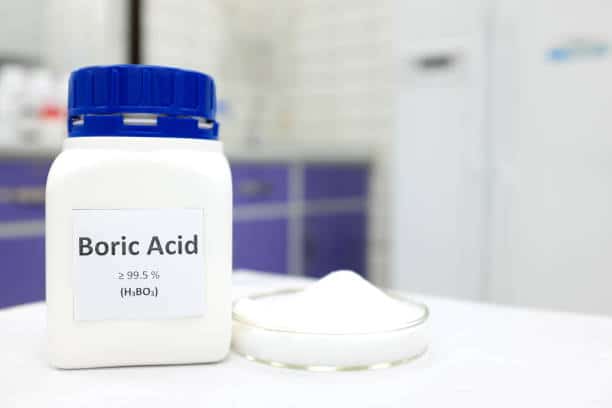Can boric acid kill sperm? This intriguing question touches on both chemistry and biology. Boric acid is a compound with various uses but its potential effect on human sperm is a topic that has sparked interest and research over the years.
Some studies suggest that boric acid might indeed have spermicidal properties, meaning it could potentially immobilize or kill sperm. However, it’s important to note that boric acid is not recommended as a contraceptive method due to potential side effects.
The exact mechanism of how boric acid interacts with sperm is still not fully understood, and research in this area is ongoing. However, we will be exposing the effect of boric acid on sperm in this article.
What is Boric Acid?
Boric acid, also known as orthoboric acid, boracic acid, or hydrogen orthoborate, is a compound of boron, oxygen, and hydrogen with the formula B(OH)31. It’s a weak acid that has antiviral, antifungal, and antiseptic properties.
In its pure form, boric acid is a white, odorless crystalline compound. It’s water-soluble and can be found naturally in certain minerals and volcanic waters.
Recommended: Top 6 Signs Of Poor Egg Quality You Should Know
Boric acid has a wide range of uses. It’s often used as an antiseptic, insecticide, flame retardant, and a precursor to other boron compounds. It’s also used in the manufacture of heat-resistant glass and enamels.

Interestingly, boric acid is also a part of homeopathic medicines used for treating vaginal discharge and itching. It’s even used in swimming pool maintenance to stabilize the pH level of water and prevent problems with algae.
However, it’s important to note that boric acid can be irritating to the skin and may cause severe reactions. So, it’s always a good idea to consult a healthcare provider before applying boric acid to any body part.
The Role of Boric Acid in Vaginal Health
Boric acid is known for its antifungal and antibacterial properties. It’s often used in the form of suppositories to treat vaginal infections like yeast infections or bacterial vaginosis.
Interestingly, boric acid works by creating an environment that inhibits the growth of harmful microorganisms such as Candida, the fungus responsible for yeast infections, and certain bacteria associated with bacterial vaginosis. This is because a healthy vagina is naturally acidic, which reduces the growth of many pathogens1.
Research suggests that when used appropriately, boric acid suppositories can help reduce the risk of recurrent infections. In some cases, they even work more effectively than traditional medications, like some antifungals, which are used for treating yeast infections.
Recommended: Does Sex Affect Periods?
However, it’s important to note that boric acid suppositories are not FDA-approved. So, it’s always a good idea to speak with your healthcare provider before using them to treat any vaginal infection.
Remember, while boric acid can be a useful tool in maintaining vaginal health, it should be used correctly and in moderation. Overuse or incorrect use can lead to toxicity, just like salt. So, it’s always best to follow the advice of a healthcare professional when using boric acid for vaginal health.
I hope this gives you a better understanding of the role of boric acid in vaginal health. If you have any more questions, feel free to ask!
Understanding Sperm Viability
Sperm viability refers to the proportion of live, functional sperm in a semen sample. It’s a crucial factor in male fertility. You see, for successful fertilization, sperm must not only be alive but also can move and penetrate an egg.
Now, various factors can affect sperm viability. These include lifestyle choices, such as smoking and alcohol consumption, and medical conditions, like varicocele or hormonal imbalances. Even prolonged exposure to heat can decrease sperm viability!
To assess sperm viability, a semen analysis is typically performed. This test evaluates several sperm parameters, including count, motility (that’s the ability to move), morphology (the size and shape of the sperm), and of course, viability.
Recommended: Top 5 Foods To Avoid While Taking Letrozole For Fertility
It’s important to note that lower sperm viability doesn’t necessarily mean infertility. Many men with lower sperm viability are still able to conceive. However, if you’re having trouble conceiving and suspect a problem with sperm viability, it’s a good idea to consult a healthcare professional.
So, in a nutshell, understanding sperm viability is key to understanding male fertility. It’s a complex topic, but I hope this gives you a good starting point!

Can Boric Acid Kill Sperm?
Yes, boric acid can kill sperm. However, it’s important to note that while boric acid has some spermicidal properties, it’s not a reliable or recommended method of contraception. If you’re considering contraceptive options, it’s best to consult with a healthcare professional for safe and effective methods.
Boric acid is believed to disrupt the cell membranes of sperm upon contact. This disruption can lead to several effects on sperm:
- Immobilization: Boric acid can immobilize sperm by interfering with their ability to move or swim effectively. This impairs their ability to reach and fertilize an egg.
- Reduced Viability: Boric acid may reduce the overall viability of sperm, making them less likely to successfully fertilize an egg.
- Cell Damage: The interaction with boric acid can cause structural damage to the sperm cell, potentially leading to cell death.
While it’s common in daily products like cleaners and cosmetics, boric acid can be harmful in large amounts. It may cause vomiting, diarrhea, stomach pain, and skin problems. Some findings hint that large amounts of boric acid can harm the male reproductive system, resulting in less active and viable sperm. However, low exposure is generally safe and doesn’t significantly harm sperm or fertility.
Recommended: Can Sex Make You Constipated?
In summary, Although boric acid has the potential to immobilize and kill sperm and negatively affect fertility, it is not an effective option for pregnancy prevention. If you’re considering contraceptive options, it’s best to consult with a healthcare professional for a safe and effective method.
Safety and Precautions When Using Boric Acid
Let’s discuss the safety measures and precautions when using boric acid in the vagina.
- Consult a Healthcare Provider: Before using boric acid vaginally, always consult a healthcare provider. They can provide accurate advice based on your health condition.
- Not for Pregnant Women: Boric acid is not safe to use during pregnancy as it’s toxic to the developing fetus.
- Avoid Oral Consumption: Boric acid is highly poisonous when taken orally. So, ensure it’s used only as a vaginal suppository.
- Limited Use: Don’t overuse boric acid. Stop vaginal treatments when your symptoms go away, unless otherwise advised by a healthcare professional.
- Personal Protective Equipment (PPE): Wear appropriate PPE, such as gloves, when handling boric acid to protect your skin from direct contact.
- Avoid Open Wounds: Boric acid irritates open wounds in and around the vagina and should not be used in such cases.
- Storage: Store boric acid out of the reach of children in a cool, dry place with a tightly sealed container.
Recommended: Does Blue Cross Blue Shield Cover Testosterone Treatment?
Remember, safety first! Always follow these precautions to ensure safe handling and use of boric acid in the vagina.
Alternatives to Boric Acid for Vaginal Health
It’s important to note that boric acid suppositories are generally safe when used as directed, but they are poisonous when ingested orally.
Now, if you’re looking for alternatives, there are several natural remedies available:
- Probiotics: These are beneficial bacteria that can help maintain a healthy balance of microorganisms in the vagina.
- Garlic: Known for its antimicrobial properties, garlic is sometimes used as a home remedy for bacterial vaginosis.
- FemiClear BV Symptoms: This is a natural remedy that is an effective standalone solution for BV symptoms in just 2 days.
- NeuEve: This is a 100% plant-based product that uses vitamins and essential oils to naturally rebalance vaginal pH and break the cycle of bad vaginal odor.
Recommended: Top 4 Signs That a Man Has Not Been Sexually Active
Remember, it’s always best to consult with a healthcare provider before starting any new treatment regimen. They can provide guidance based on your specific needs and circumstances. Stay healthy!
FAQs
How is boric acid used in vaginal health?
Boric acid is often used in the form of suppositories to treat certain vaginal infections, such as yeast infections and bacterial vaginosis. It helps to restore the vaginal pH balance and suppress the growth of harmful bacteria and fungi.
Is it safe to use boric acid when trying to conceive?
Given the potential effects of boric acid on sperm, it’s generally advised to avoid using boric acid vaginally when trying to conceive. Consult with a healthcare provider for alternative treatments if you’re dealing with vaginal infections while attempting to become pregnant.
How long after using boric acid is it safe to try to conceive?
There’s no universal guideline, but it’s generally recommended to wait until after you’ve completed your boric acid treatment and your symptoms have resolved. Discussing your specific situation with a healthcare provider can offer more personalized advice.
Can boric acid cause infertility?
There’s no direct evidence that boric acid causes long-term infertility in humans. However, because it can affect sperm viability, using it vaginally might temporarily reduce the chances of conception. Always use boric acid as directed by a healthcare professional, especially if you’re concerned about fertility.
Where can I find more information about the safety of boric acid for reproductive health?
For the most accurate and up-to-date information, consult with healthcare professionals, such as a gynecologist or a fertility specialist. Moreover, reputable medical websites and peer-reviewed journals can provide research findings and guidelines on the use of boric acid and its impact on reproductive health.
Conclusion
While boric acid has been shown to have some spermicidal properties, meaning it can immobilize or harm sperm, it is not a reliable or effective method for killing sperm or preventing pregnancy. Studies have indicated that acute exposure to boric acid can adversely affect sperm formation and sperm quality, but these effects are readily reversible. Therefore, it is not recommended to rely on boric acid as a form of birth control. Always consult with a healthcare professional for safe and effective contraceptive options.

I loved this article! Super helpful and well-explained.